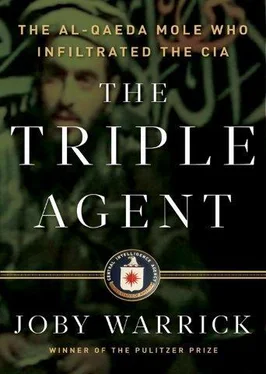The sheikh was not one for small talk. As a young radical growing up in Cairo, the man born as Mustafa Ahmed Abu al-Yazid had been imprisoned and tortured, along with Ayman al-Zawahiri, for conspiring to kill Egyptian president Anwar Sadat. He had joined Zawahiri’s Egyptian terrorist cell, and been present at the merger with al-Qaeda. He had survived numerous attempts on his life, including a close call in 2006, when CIA missiles struck a house in northern Pakistan where Zawahiri was believed to be a guest.
Now nearing the end of his third decade as a wanted terrorist, he was scrupulously attentive to his own safety and utterly indifferent to that of others. The CIA’s classified profile, drawn from informants and intercepted communications, was a portrait of an insecure cynic who was hypercontrolling, manipulative, cunning, and deeply disliked by his subordinates. He surrounded himself with machine gun–toting guards, while goading his followers to self-sacrifice with his trademark warning: “If you do not march forth, Allah will punish you with a painful torment.”
As al-Masri contemplated Balawi, he pondered the opportunity before him. Al-Qaeda’s leadership had lost more than a dozen senior managers and hundreds of fighters in less than a year. Here, perhaps, was a way to strike back. The cost to the terrorist group, if any, would be minimal: one obscure Jordanian doctor who would not be missed.
As they talked, a tentative plan began to take flesh, focusing on the person of Ali bin Zeid, Balawi’s Jordanian handler. As a symbolic target bin Zeid was close to perfect. He was an officer with Jordan’s Mukhabarat intelligence service, an organization that had inflicted more wounds on al-Qaeda than any single organization other than the CIA itself. He was working closely with the American spy agency, and he was blood kin to Jordan’s modern monarch, King Abdullah II, an Arab who had made peace with Israel and thus, in al-Qaeda’s eyes, was one of the Muslim world’s leading apostates. If they could manage to kill him, the jihadists could strike an unforgettable blow against a mortal enemy. Even better, if they could capture bin Zeid, they could humiliate him and his government before the entire world. He could be tried before an al-Qaeda judge, then convicted, sentenced, and executed in a spectacle broadcast over the Web for all to see.
Al-Masri had the bait for such a trap: Humam al-Balawi. All that remained was for the doctor to somehow convince bin Zeid to come to Pakistan. Here al-Qaeda could help. Al-Masri and the other jihadist veterans were students of the Western intelligence agencies and paid close attention to the CIA’s pronouncements in the Western news media. Some in the group had been interrogated in U.S. detention camps, including the prison at Guantánamo Bay. They knew the kinds of details that the Americans would find most enticing.
Thus began the al-Qaeda–led campaign to transform Balawi into the indispensable agent. It would happen in stages. The informant would start with a grabber, something that would instantly command the CIA’s attention. It would have to be solid and credible, yet not so outrageous as to raise suspicions. It would have to be something the technology-obsessed Americans would immediately appreciate.
The video was al-Masri’s fiendishly clever idea. Al-Qaeda’s propaganda arm already had a crude production studio with cameras and mixing software. Now it would supply the actors, al-Rahman and a handful of terrorist leaders and Balawi, all appearing as themselves.
The shooting took place in late August. Al-Rahman and Balawi took their places and pretended to engage in conversation as the camera rolled. The scene was blocked so that the video footage would have the appearance of an amateur’s casual recording of an ordinary gathering. Afterward the production team extracted a short digital snippet. All that remained was for the Jordanian to attach the file to an e-mail and wait.
The first stage was to be followed by a series of small enticements, spread out over weeks to keep the Western analysts interested and eager. Balawi would appear to help the CIA in its quest to find targets, offering advice here and authentic detail there, appearing to move ever closer to, but never quite achieving, a big score. Al-Qaeda would wait for the aftershocks from the al-Rahman video to die down before unveiling the ultimate dangle. Al-Masri knew how hungry the Americans were for information about bin Laden and Zawahiri. The No. 2 leader, despite his secretiveness, could plausibly want to meet with Balawi because of his health problems. Al-Qaeda would supply the details of an imagined medical visit that would ring true to the CIA’s analysts, down to the last scar and tooth filling.
Each piece of bait was eagerly snapped up. Whether the Jordanian and American intelligence agencies were entirely convinced was impossible to tell from Pakistan, but Balawi now commanded their rapt attention. Bin Zeid praised his most successful recruit in a November e-mail that Balawi shared with his hosts. “You have lifted our heads in front of the Americans!” bin Zeid had gushed.
Balawi was thrilled to be part of it. The storied American spy agency had ensnared so many jihadists with its technology, money, and clever tricks. Now it appeared to have fallen victim to al-Qaeda’s clever ruse, one surely as clever as any dreamed up in the West.
“All praise is due to God, the bait fell in the right spot,” Balawi said, “and they went head over heels with excitement.”
Humam al-Balawi’s handlers were surely interested, but they were not foolhardy. The Jordanian physician was dealt one disappointment after another as his intended target refused to leap into al-Qaeda’s trap.
The initial scheme centered on a meeting in Peshawar, the ancient Pashtun capital and now a metropolis of one and a half million people in northwestern Pakistan. Balawi would insist on meeting bin Zeid alone, and at the right moment al-Qaeda operatives would burst in with guns and the Mukhabarat officer would be kidnapped—or “arrested,” as Balawi would say. The CIA would almost certainly be watching, and its agents would try to interfere, so there was a Plan B. If the kidnappers were trapped or cornered in their escape, they would execute their hostage as their final act.
Bin Zeid was initially receptive to a Peshawar meeting, since CIA officials knew the city well and had many operatives there. It was the CIA’s Islamabad office that nixed the plan. There were too many risks, including the high likelihood that Pakistan’s spy agency would learn of the meeting and possibly compromise Balawi’s identity.
After Peshawar, the North Waziristan hub city of Miranshah was the militants’ obvious next choice. Al-Qaeda’s close allies, the Haqqani network, practically owned the town, and the Mehsud-led Taliban alliance now operated out of villages in the outskirts. Bin Zeid could disappear inside the town’s maze of mud walls, alleys, and bazaars before the CIA knew what had happened.
When bin Zeid said no to Miranshah, Balawi kept asking. He offered variations on the plan, and he tried to lay on the guilt. “I’m the one taking all the risks,” he repeated.
Balawi’s insistence was starting to grate, but veteran CIA officers chalked it up to the agent’s greenness. The informant clearly was afraid, and he hadn’t yet grasped the limits of the CIA’s reach. If given any choice at all, the Americans would never consent to having such an important meeting in a place like Miranshah, a town where the agency’s absolute control over conditions was far from guaranteed.
Only one location made sense for the meeting, bin Zeid wrote. It was the American base at Khost, just across the border and over the mountains from Miranshah. Balawi could travel there quickly and return to Pakistan before anyone missed him. Khost offered complete security and protection from accidental discovery by Taliban spies.
Читать дальше












